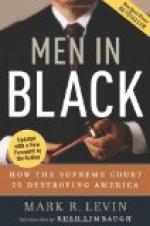After talking with the little prisoner she addresses the judge. “She says its no use, your Honor, she does not want to reform—it will not be worth while to put her on probation.”
“Committed to the Mary Magdalene Home,” says the judge, and the name brings a startling surmise as to what He of Galilee would have said.
The foregoing is only a typical session of the court. Night after night, from eight o’clock until one in the morning, the scene is repeated. The moral effect and its reaction upon those who conduct the proceedings—the judges, officers, and the police, cannot but be deplorable; the evil done to those forcibly brought there could not be over-estimated.
Substantially the law is that the women may not loiter in the streets nor solicit in the streets, or in any building open to the public. They may live neither in a tenement house nor in a disreputable house. The law makes it a crime for the women to walk abroad or stay at home. Their existence is not a crime, but only in an indirect way the law makes them outlaws. Anyone wishing to prosecute or persecute finds it easy to do so. The worst enemies of these unhappy women are to be found, curiously enough, among both the best and the most evil people in the community. The unspeakably depraved are the men who, either as procurers, blackmailers, or the miserable men who live on a share of their earnings. The excellent people who oppose any remedial legislation which might relieve the situation, seem equally responsible for the present condition, however well-intentioned they may be.
One effect of the present system is the practically unchecked transmission of disease. A reform in this direction would not solve the basic problem, for there would remain full opportunities of blackmail and extortion, but it might still remove a menace to the health of the community which is probably more serious than tuberculosis.
A statute to this end was enacted in New York State a few years ago: an act for the medical examination of the women. It was declared unconstitutional because of one word. It should have read, “the judge may”; instead, it read, “the judge must.” Far more difficult to deal with is the opposition of the people who believe that the moral sense of the community would be jeopardized by any laws suggesting that prostitution is unavoidable.
In ironic contrast to the failure of legislation to prevent the spread of disease, is the success of an ill-advised statute making adultery a crime. Under it, a married man having relations with a prostitute and the woman herself, are subject to criminal prosecution. It affords a fresh field for extortion, how largely used it is impossible to say.
The history of the passage of the adultery act presents one of the most ghastly jokes ever perpetrated by a State Legislature.
For years such a bill had been introduced in the New York Legislature and had been passed by either the Assembly or the Senate without comment and then quietly killed in the other house. It was obvious that such a law could not be properly enforced and its blackmailing possibilities were manifest, yet no one, not even Governor Hughes, who was then in office, could be openly opposed to its passage.




